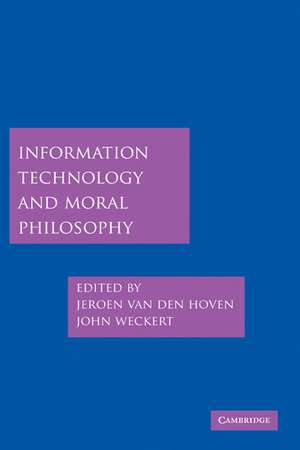Information Technology and Moral Philosophy: Cambridge Studies in Philosophy and Public Policy
Editat de Jeroen van den Hoven, John Weckerten Limba Engleză Paperback – 22 noi 2009
| Toate formatele și edițiile | Preț | Express |
|---|---|---|
| Paperback (1) | 326.92 lei 6-8 săpt. | |
| Cambridge University Press – 22 noi 2009 | 326.92 lei 6-8 săpt. | |
| Hardback (1) | 477.39 lei 6-8 săpt. | |
| Cambridge University Press – 30 mar 2008 | 477.39 lei 6-8 săpt. |
Din seria Cambridge Studies in Philosophy and Public Policy
-
 Preț: 326.70 lei
Preț: 326.70 lei -
 Preț: 452.84 lei
Preț: 452.84 lei -
 Preț: 321.81 lei
Preț: 321.81 lei -
 Preț: 253.29 lei
Preț: 253.29 lei -
 Preț: 293.17 lei
Preț: 293.17 lei -
 Preț: 333.19 lei
Preț: 333.19 lei -
 Preț: 283.50 lei
Preț: 283.50 lei -
 Preț: 283.79 lei
Preț: 283.79 lei - 11%
 Preț: 509.10 lei
Preț: 509.10 lei -
 Preț: 319.16 lei
Preț: 319.16 lei -
 Preț: 453.23 lei
Preț: 453.23 lei -
 Preț: 293.17 lei
Preț: 293.17 lei -
 Preț: 229.56 lei
Preț: 229.56 lei -
 Preț: 422.91 lei
Preț: 422.91 lei -
 Preț: 275.82 lei
Preț: 275.82 lei -
 Preț: 439.33 lei
Preț: 439.33 lei -
 Preț: 375.19 lei
Preț: 375.19 lei -
 Preț: 441.67 lei
Preț: 441.67 lei - 5%
 Preț: 312.89 lei
Preț: 312.89 lei -
 Preț: 387.05 lei
Preț: 387.05 lei -
 Preț: 349.03 lei
Preț: 349.03 lei -
 Preț: 227.40 lei
Preț: 227.40 lei -
 Preț: 230.33 lei
Preț: 230.33 lei -
 Preț: 238.42 lei
Preț: 238.42 lei -
 Preț: 272.36 lei
Preț: 272.36 lei -
 Preț: 287.87 lei
Preț: 287.87 lei - 11%
 Preț: 549.36 lei
Preț: 549.36 lei -
 Preț: 229.39 lei
Preț: 229.39 lei
Preț: 326.92 lei
Nou
Puncte Express: 490
Preț estimativ în valută:
62.56€ • 65.08$ • 51.65£
62.56€ • 65.08$ • 51.65£
Carte tipărită la comandă
Livrare economică 15-29 aprilie
Preluare comenzi: 021 569.72.76
Specificații
ISBN-13: 9780521671613
ISBN-10: 0521671612
Pagini: 428
Dimensiuni: 150 x 226 x 28 mm
Greutate: 0.64 kg
Editura: Cambridge University Press
Colecția Cambridge University Press
Seria Cambridge Studies in Philosophy and Public Policy
Locul publicării:New York, United States
ISBN-10: 0521671612
Pagini: 428
Dimensiuni: 150 x 226 x 28 mm
Greutate: 0.64 kg
Editura: Cambridge University Press
Colecția Cambridge University Press
Seria Cambridge Studies in Philosophy and Public Policy
Locul publicării:New York, United States
Cuprins
Introduction; 1. Norbert Wiener and the rise of information ethics Terrell Ward Bynum; 2. Why we need better ethics for emerging technologies James H. Moor; 3. Information ethics: its nature and scope Luciano Floridi; 4. The transformation of the public sphere: political authority, communicative freedom, and internet publics James Bohman; 5. Democracy and the internet Cass R. Sunstein; 6. The social epistemology of blogging Alvin I. Goldman; 7. Plural selves and relational identity: intimacy and privacy online Dean Cocking; 8. Identity and information technology Steve Matthews; 9. Trust, reliance, and the internet Philip Pettit; 10. Esteem, identifiability, and the internet Geoffrey Brennan and Philip Pettit; 11. Culture and global networks: hope for a global ethics? Charles Ess; 12. Collective responsibility and information and communication technology Seumas Miller; 13. Computers as surrogate agents Deborah G. Johnson and Thomas M. Powers; 14. Moral philosophy, information technology, and copyright: the Grokster case Wendy J. Gordon; 15. Information technology, privacy, and the protection of personal data Jeroen van den Hoven; 16. Embodying values in technology: theory and practice Mary Flanagan, Daniel C. Howe and Helen Nissenbaum; 17. Information technology research ethics Dag Elgesem; 18. Distributive justice and the value of information: a (broadly) Rawlsian approach Jeroen van den Hoven and Emma Rooksby.
Recenzii
'This collection of 18 essays is rich in ideas on the implications of information technology and morality. Variety is the collection's strong point, though there are certainly some common themes, including the nature of identity and agency … This work will appeal to scholars in several disciplines, including communication, political science, computer science, and philosophy. Summing up: recommended.' S. E. Forschler, Choice
Descriere
An international team of philosophers shed light on many of the ethical issues arising from information technology.



















